Nouamane Tazi
SmolVLM: Redefining small and efficient multimodal models
Apr 07, 2025



Abstract:Large Vision-Language Models (VLMs) deliver exceptional performance but require significant computational resources, limiting their deployment on mobile and edge devices. Smaller VLMs typically mirror design choices of larger models, such as extensive image tokenization, leading to inefficient GPU memory usage and constrained practicality for on-device applications. We introduce SmolVLM, a series of compact multimodal models specifically engineered for resource-efficient inference. We systematically explore architectural configurations, tokenization strategies, and data curation optimized for low computational overhead. Through this, we identify key design choices that yield substantial performance gains on image and video tasks with minimal memory footprints. Our smallest model, SmolVLM-256M, uses less than 1GB GPU memory during inference and outperforms the 300-times larger Idefics-80B model, despite an 18-month development gap. Our largest model, at 2.2B parameters, rivals state-of-the-art VLMs consuming twice the GPU memory. SmolVLM models extend beyond static images, demonstrating robust video comprehension capabilities. Our results emphasize that strategic architectural optimizations, aggressive yet efficient tokenization, and carefully curated training data significantly enhance multimodal performance, facilitating practical, energy-efficient deployments at significantly smaller scales.
StarCoder 2 and The Stack v2: The Next Generation
Feb 29, 2024



Abstract:The BigCode project, an open-scientific collaboration focused on the responsible development of Large Language Models for Code (Code LLMs), introduces StarCoder2. In partnership with Software Heritage (SWH), we build The Stack v2 on top of the digital commons of their source code archive. Alongside the SWH repositories spanning 619 programming languages, we carefully select other high-quality data sources, such as GitHub pull requests, Kaggle notebooks, and code documentation. This results in a training set that is 4x larger than the first StarCoder dataset. We train StarCoder2 models with 3B, 7B, and 15B parameters on 3.3 to 4.3 trillion tokens and thoroughly evaluate them on a comprehensive set of Code LLM benchmarks. We find that our small model, StarCoder2-3B, outperforms other Code LLMs of similar size on most benchmarks, and also outperforms StarCoderBase-15B. Our large model, StarCoder2- 15B, significantly outperforms other models of comparable size. In addition, it matches or outperforms CodeLlama-34B, a model more than twice its size. Although DeepSeekCoder- 33B is the best-performing model at code completion for high-resource languages, we find that StarCoder2-15B outperforms it on math and code reasoning benchmarks, as well as several low-resource languages. We make the model weights available under an OpenRAIL license and ensure full transparency regarding the training data by releasing the SoftWare Heritage persistent IDentifiers (SWHIDs) of the source code data.
FinGPT: Large Generative Models for a Small Language
Nov 03, 2023



Abstract:Large language models (LLMs) excel in many tasks in NLP and beyond, but most open models have very limited coverage of smaller languages and LLM work tends to focus on languages where nearly unlimited data is available for pretraining. In this work, we study the challenges of creating LLMs for Finnish, a language spoken by less than 0.1% of the world population. We compile an extensive dataset of Finnish combining web crawls, news, social media and eBooks. We pursue two approaches to pretrain models: 1) we train seven monolingual models from scratch (186M to 13B parameters) dubbed FinGPT, 2) we continue the pretraining of the multilingual BLOOM model on a mix of its original training data and Finnish, resulting in a 176 billion parameter model we call BLUUMI. For model evaluation, we introduce FIN-bench, a version of BIG-bench with Finnish tasks. We also assess other model qualities such as toxicity and bias. Our models and tools are openly available at https://turkunlp.org/gpt3-finnish.
Scaling Data-Constrained Language Models
May 25, 2023Abstract:The current trend of scaling language models involves increasing both parameter count and training dataset size. Extrapolating this trend suggests that training dataset size may soon be limited by the amount of text data available on the internet. Motivated by this limit, we investigate scaling language models in data-constrained regimes. Specifically, we run a large set of experiments varying the extent of data repetition and compute budget, ranging up to 900 billion training tokens and 9 billion parameter models. We find that with constrained data for a fixed compute budget, training with up to 4 epochs of repeated data yields negligible changes to loss compared to having unique data. However, with more repetition, the value of adding compute eventually decays to zero. We propose and empirically validate a scaling law for compute optimality that accounts for the decreasing value of repeated tokens and excess parameters. Finally, we experiment with approaches mitigating data scarcity, including augmenting the training dataset with code data or removing commonly used filters. Models and datasets from our 400 training runs are publicly available at https://github.com/huggingface/datablations.
BLOOM: A 176B-Parameter Open-Access Multilingual Language Model
Nov 09, 2022Abstract:Large language models (LLMs) have been shown to be able to perform new tasks based on a few demonstrations or natural language instructions. While these capabilities have led to widespread adoption, most LLMs are developed by resource-rich organizations and are frequently kept from the public. As a step towards democratizing this powerful technology, we present BLOOM, a 176B-parameter open-access language model designed and built thanks to a collaboration of hundreds of researchers. BLOOM is a decoder-only Transformer language model that was trained on the ROOTS corpus, a dataset comprising hundreds of sources in 46 natural and 13 programming languages (59 in total). We find that BLOOM achieves competitive performance on a wide variety of benchmarks, with stronger results after undergoing multitask prompted finetuning. To facilitate future research and applications using LLMs, we publicly release our models and code under the Responsible AI License.
MTEB: Massive Text Embedding Benchmark
Oct 13, 2022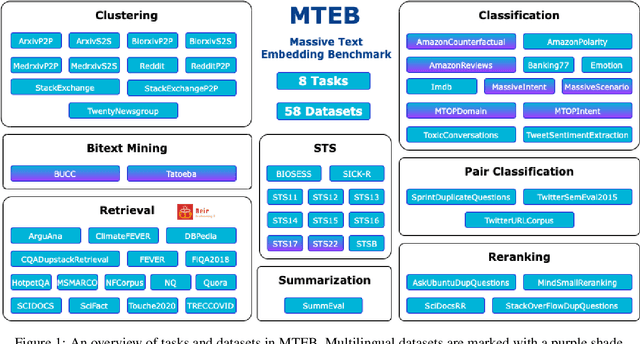
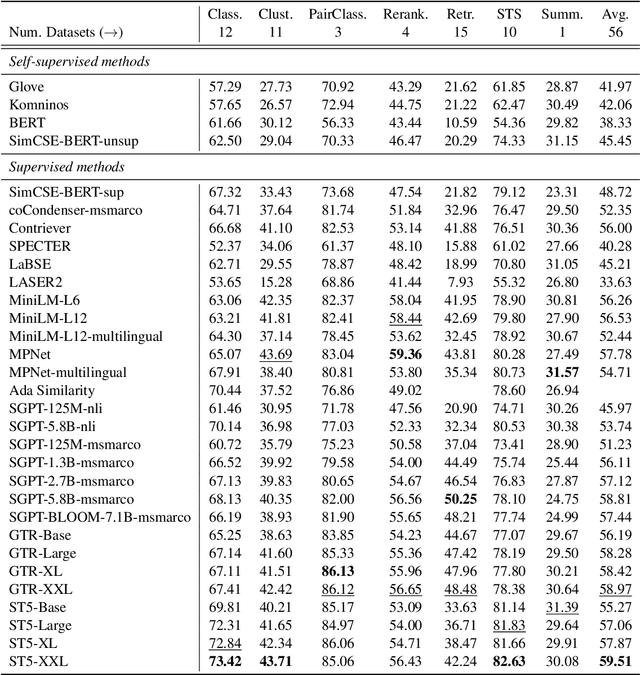
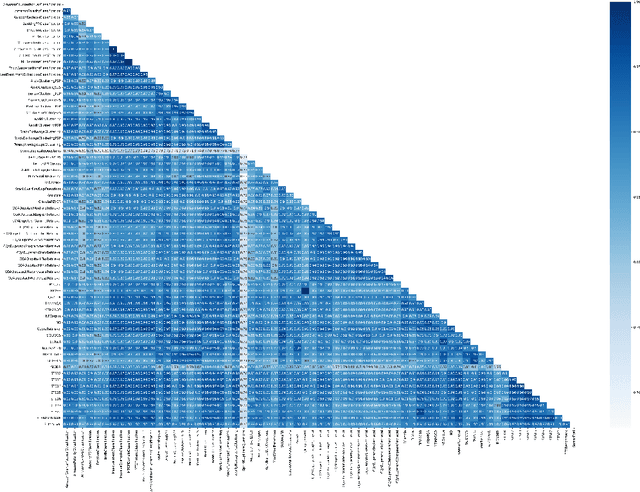
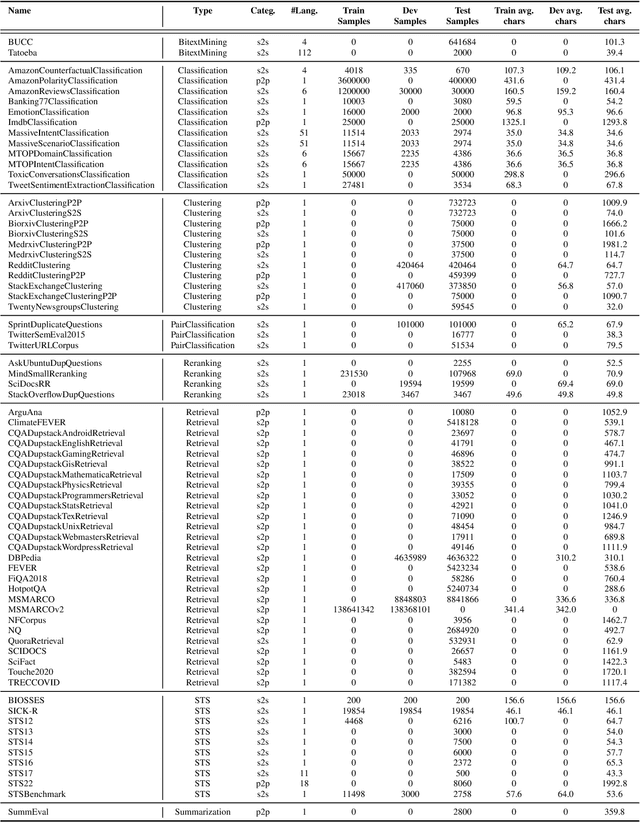
Abstract:Text embeddings are commonly evaluated on a small set of datasets from a single task not covering their possible applications to other tasks. It is unclear whether state-of-the-art embeddings on semantic textual similarity (STS) can be equally well applied to other tasks like clustering or reranking. This makes progress in the field difficult to track, as various models are constantly being proposed without proper evaluation. To solve this problem, we introduce the Massive Text Embedding Benchmark (MTEB). MTEB spans 8 embedding tasks covering a total of 56 datasets and 112 languages. Through the benchmarking of 33 models on MTEB, we establish the most comprehensive benchmark of text embeddings to date. We find that no particular text embedding method dominates across all tasks. This suggests that the field has yet to converge on a universal text embedding method and scale it up sufficiently to provide state-of-the-art results on all embedding tasks. MTEB comes with open-source code and a public leaderboard at https://huggingface.co/spaces/mteb/leaderboard.
Masader Plus: A New Interface for Exploring +500 Arabic NLP Datasets
Aug 01, 2022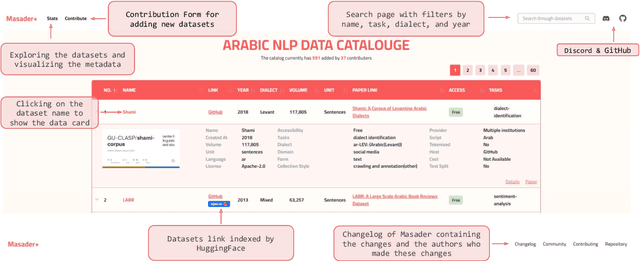
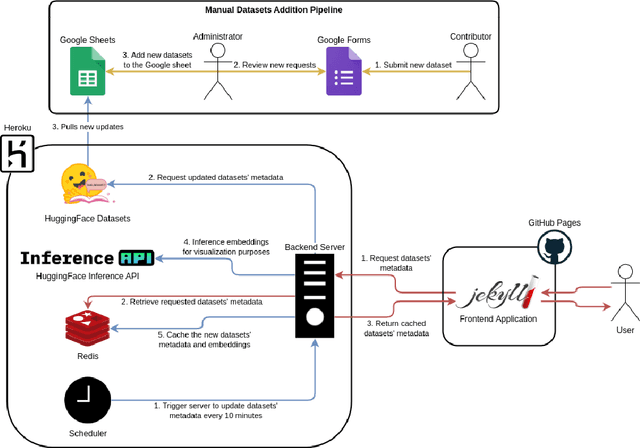
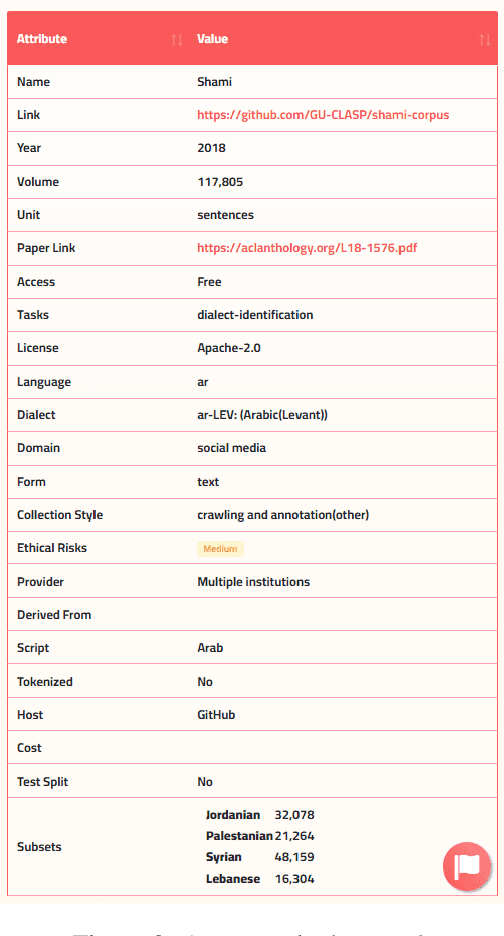
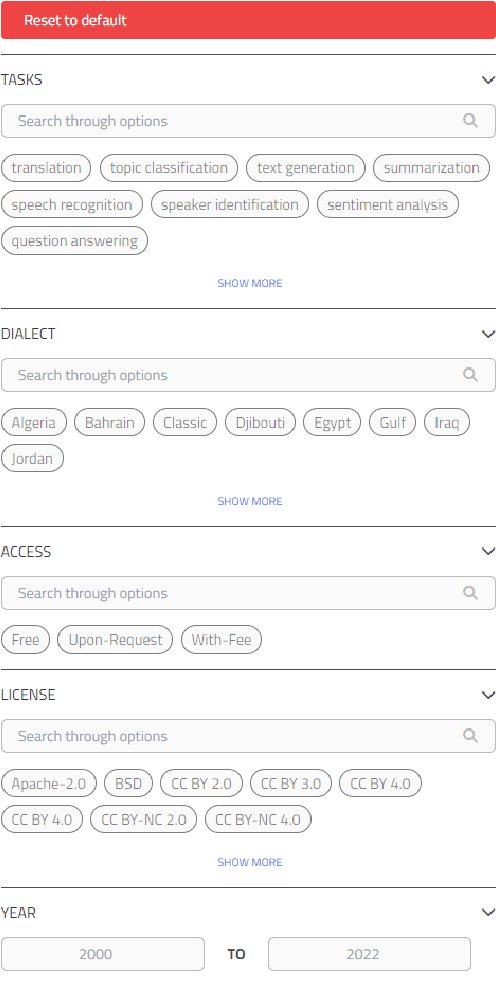
Abstract:Masader (Alyafeai et al., 2021) created a metadata structure to be used for cataloguing Arabic NLP datasets. However, developing an easy way to explore such a catalogue is a challenging task. In order to give the optimal experience for users and researchers exploring the catalogue, several design and user experience challenges must be resolved. Furthermore, user interactions with the website may provide an easy approach to improve the catalogue. In this paper, we introduce Masader Plus, a web interface for users to browse Masader. We demonstrate data exploration, filtration, and a simple API that allows users to examine datasets from the backend. Masader Plus can be explored using this link https://arbml.github.io/masader. A video recording explaining the interface can be found here https://www.youtube.com/watch?v=SEtdlSeqchk.
 Add to Chrome
Add to Chrome Add to Firefox
Add to Firefox Add to Edge
Add to Edge